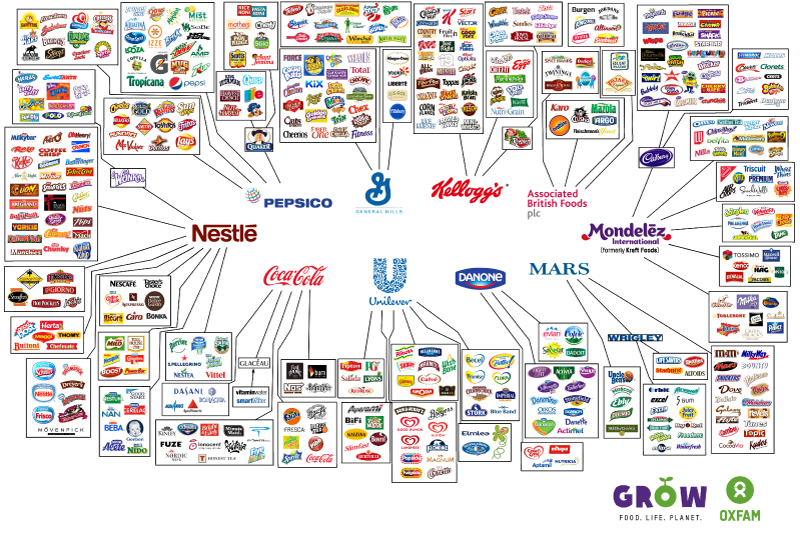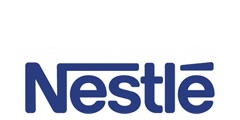Content Sections
Nestlé – the company that persuaded millions to use infant formula in place of breast milk, and that continues to push its baby foods in violation of internationally agreed marketing standards – is now aiming to be a leader in medical foods for the management and prevention of the very health conditions the company is at least partially accountable for creating. Yes, one of the target diseases is the scourge of modern life, type 2 diabetes, which is primarily the result of bad diets, especially too many simple carbs and sugar. And that’s just what Nestlé delivers by the truckload, in the form of sugary cereals for kids like Cheerios, Golden Nuggets and Golden Grahams, and confectionary brands including Aero, Kit Kat, Milky Bar, Quality Street, Rolo, Smarties and Yorkie bars.

Global brand ownership by 10 Big Food giants [https://www.behindthebrands.org/take-action/]
Nestlé: ‘A new role for nutrition in disease prevention…’
Nestlé Health Science and its research partner, Nestlé Institute of Health Sciences, commenced operations in January 2011. They aim to develop, “Science-based personalised nutritional solutions”, and to, “Create a new role for nutrition in disease prevention and management”. In March this year, Nestlé Institute of Health Sciences announced it was also going to incorporate cell-engineering technologies into its research.
Nestlé already has a growing ‘health’ product range, which it says, “Offers nutritional solutions for people with specific dietary needs related to illnesses, disease states or the special challenges of different life stages”. One such product is Boost Glucose Control Drink – but, with tapioca dextrin, fructose, and corn syrup solids near the top of the ingredients list, we struggle to see how such a product can effectively manage diabetes. What on earth will Nestlé’s type 2 diabetes prevention products look like, we wonder?
Brand expansion strategy
A careful look at how food giants like Nestlé, Kraft, Unilever, Coca-Cola, PepsiCo and others become so dominant in the food industry is quite revealing. One of their strongest cards is their brand expansion strategy. This allows them to continue to expand through a succession of take-overs and mergers, while disguising their presence under a host of different brands. This makes it difficult for the general public to trace its many marketplace offerings back to the parent company.
While growing its brand portfolio is seen as a rite of passage for any big company, and is expected by its shareholders, it’s the underlying ethics – or should we say lack of ethics – of the process that many of us have a problem with.
A child growing up in a less health-conscious family could easily find itself largely subsisting on Nestlé products, with those responsible for the child barely even noticing – or caring. The mother who develops mastitis during the early days of breast-feeding may switch to a Nestlé formula because she is simply unaware of any alternative way of dealing with the problem, such as managing the infection by natural means. It’s then on to Nestlé follow-on milks, Nestlé biscuits, Nestlé breakfast cereals – and, of course, Nestlé confectionary snacks to keep those energy (read: blood glucose) levels up. With this kind of start to life, dietary, behavioural and physiological patterns are set. The child has been effectively programmed to ensure a very high risk of developing type 2 diabetes in later life.
Create a problem, now deliver a ‘solution’
It’s been known for many years that dietary and lifestyle patterns established in childhood tend to remain with people for the majority of their lives. It’s no surprise, therefore, that as the consumption of junk food diets escalates, so too does the global frequency of type 2 diabetes, which the World Health Organization (WHO) now gives as 346 million cases. The WHO states that the main prevention strategies of type 2 diabetes are, “Healthy diet, regular physical activity, maintaining a normal body weight”. The clear role of inflammation also implicates poor diet in the development of the disease. Government strategies don’t go far enough in dealing with the growing problem, and that of chronic disease generally. In the USA, for example, it is predicted that over 50% of adults will suffer from pre-diabetes or type 2 diabetes by 2020.
The situation is certainly ripe for the picking by Nestlé. Doctors are responsible for diagnosis of diseases like type 2 diabetes. Many of them know little about nutrition, but are aware that bad diets and inadequate physical activity are the main causes. They are trained to prescribe, so the prescription of medical foods will appeal to them much more than providing their patients with personalised diet and lifestyle programmes.
Dealing effectively with the chronic disease burden
Unfortunately, nutritionally, countless millions of us have come a very long way down a road of processed and junk food, ready-made meals and excess consumption of simple carbohydrates. Personalised diet and lifestyle programmes designed to address specific chronic disease states seem very drastic, but they are precisely what have been shown to yield results when managed carefully by doctors and practitioners of Functional Medicine and other nutrition-based therapies. There is a general need to get away from processed foods of any sort, and to re-establish preparation of diverse and varied whole foods. Simple sugars need to be reduced or eliminated from the diet, and healthy proteins and fats need to be consumed. Also of crucial importance is regular physical activity, safe exposure to sunshine, stress reduction, adequate rest and relaxation, and even fasting – for example, between 3 daily meals.
Nestlé says it wants to play a key role in, “Stemming the rising tide of chronic disease”. We wonder if it will start by removing most of its children’s cereals and confectionary products from the market!
Call to action
- Avoid Nestlé products! ‘Baby Milk Action’, the UK campaign group that leads the international boycott initiated in the late 1970s, has upped the ante against Nestlé given its irresponsible marketing practice
- Check out the list of Nestlé products to boycott at http://www.babymilkaction.org/htmlemails/email290612/email290612.html
- Please share this story widely using your social networks!








Comments
your voice counts
There are currently no comments on this post.
Your voice counts
We welcome your comments and are very interested in your point of view, but we ask that you keep them relevant to the article, that they be civil and without commercial links. All comments are moderated prior to being published. We reserve the right to edit or not publish comments that we consider abusive or offensive.
There is extra content here from a third party provider. You will be unable to see this content unless you agree to allow Content Cookies. Cookie Preferences